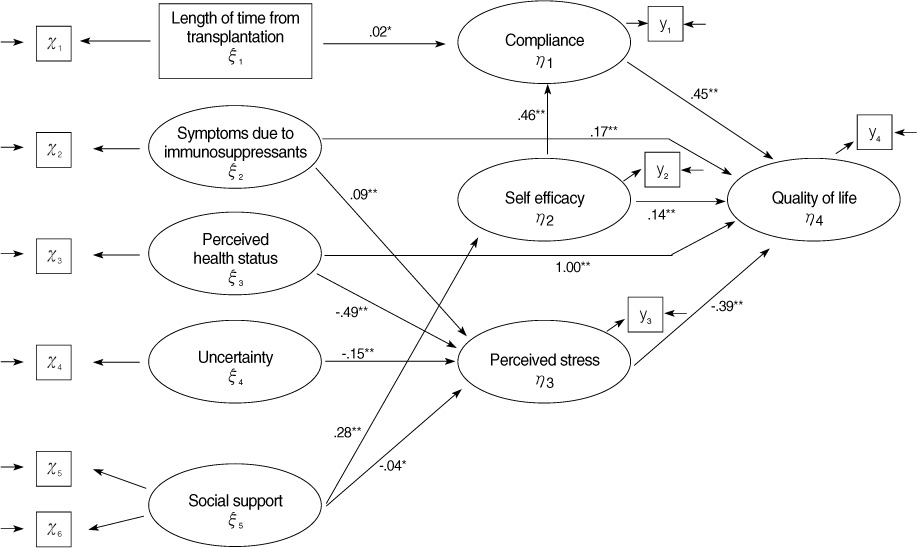J Korean Acad Nurs.
2009 Aug;39(4):518-527. 10.4040/jkan.2009.39.4.518.
A Prediction Model Development on Quality of Life in Kidney Transplant Recipients
- Affiliations
-
- 1Department of Nursing, Chodang University, Muan, Korea. opaal@hanmail.net
- 2College of Nursing, Chonnam National University, Gwangju, Korea.
- KMID: 820229
- DOI: http://doi.org/10.4040/jkan.2009.39.4.518
Abstract
-
PURPOSE: The purpose of this study was to identify factors influencing quality of life in kidney transplant recipients and to understand the concrete pathway of influence and the power of each variable, so that integrated prediction model to promote the quality of life of kidney transplant recipients could be developed.
METHODS
The sample was composed of 218 patients in follow-up care after a kidney transplant in one of 4 university hospitals in the Honam area. A structured questionnaire was used and the collected data were analyzed for fitness, using the LISREL program.
RESULTS
This model was concise and extensive in predicting the quality of life of kidney transplant recipients.
CONCLUSION
The research verified the factors influencing quality of life for kidney transplant recipients and it verified that direct factors such as perception of health state, compliance, self-efficacy, stress and indirect factors such as self-efficacy and social support can be important factors to predict the quality of life for recipients. Moreover, those variables represent 87% of variance in explaining quality of life in a prediction model so that the variables can be utilized to predict quality of life for kidney transplant recipients.
MeSH Terms
Figure
Cited by 1 articles
-
Structural Equation Modeling of Self-Care Behaviors in Kidney Transplant Patients Based on Self-Determination Theory
Hye Won Jeong, Hyang Sook So
J Korean Acad Nurs. 2018;48(6):731-742. doi: 10.4040/jkan.2018.48.6.731.
Reference
-
1. Ahn JH. The effects of the self efficacy promotion and exercise training program on anxiety, depression and quality of life of kidney transplant recipients. Journal of Korean Academy of Adult Nursing. 2001. 13:223–232.2. Bae BR. Lisrel structural equation model: Interactive Lisrel. 2005. 2nd ed. Seoul: Chunglam Publishing.3. Bentler PM, Bonett DG. Significance tests and goodness of fit in the analysis of covariance structures. Psychological Bulletin. 1980. 88:588–606.4. Cho YS. A study on stress and the quality of life of kidney transplant recipients. Journal of Korean Academy of Adult Nursing. 1999. 11:215–226.5. Frey GM. Stressor in renal transplant recipients at six week after transplantation. American Nephrology Nurses' Association. 1990. 17:443–447.6. Hayward MB, Kish JP, Frey GM, Kircher JM, Carr LS, Wolfe CM. An instrument to identify stressors in renal transplant recipients. American Nephrology Nurses' Association. 1989. 16:81–84.7. Hong EJ. A study on the relationship among stress perceived by the patients with kidney transplanted social support, and the quality of life. 2002. Seoul: Hanyang University;Unpublished master's thesis.8. Kim EM. Quality of life model for the liver transplant recipients. 2004. Seoul: Seoul National University;Unpublished doctoral dissertation.9. Kim JH, Choi HJ, Kim JS. Modeling hemodialysis patient's quality of life. Korean Academy of Fundamentals of Nursing. 1996. 3:183–199.10. Kim KS, Kang JY, Jeong IS. Health related quality of life among organ transplant recipients. Journal of Korean Academy of Nursing. 2003. 33:365–375.11. Kim MS. Knowledge and compliance of renal transplant patient. 1995. Daegu: Kyungpook National University;Unpublished master's thesis.12. Kleinbaum DG, Kupper LL, Muller KE. Applied regression analysis and other multivariate methods. 1988. Boston, MA: PWS-KENT Publishing Company.13. Lee DS, Lee EO. Social support need and perceived social support of patients having gastric cancer. The Seoul Journal of Nursing. 1997. 11:175–190.14. Lee JS. A study on the relationship among social support, stress, self-efficacy, and the quality of life in kidney transplantation patients. 1997. Seoul: Yonsei University;Unpublished master's thesis.15. Lee SM. Model equivalence in covariance structure modeling: JID approach and its application. The Korean Journal of Psychology. 1992. 11:5–23.16. Malick NP, Gokal R. Hemodialysis. The Lancet. 1999. 353:737–742.17. Milleu P, Wikoff R, McMahon M, Garrett MJ, Hohnson N. Development of a health attitude scale. Nursing Research. 1982. 31:132–136.18. Mintzer LL. Posttraumatic stress disorder in adolescent solid organ transplant recipients. 2001. USA: Northwestern University;Unpublished doctoral dissertation.19. Mishel MH. The measurement of uncertainty in illness. Nursing Research. 1981. 30:258–263.20. Moons P, De Geest S, Abraham I, Van Cleeput J, Vanhaecke J. Symptom experience associated with maintenance immunosupression after heart transplantation: Patients' appraisal of side effects. Heart & Lung. 1998. 27:315–325.21. Niu SF, Li CI. Quality of life of patients having renal replacement therapy. Journal of Advanced Nursing. 2005. 51:15–21.22. Ogutmen B, Yildirim A, Server MS, Bozfakioglu S, Ataman R, Eerk E, et al. Health-related quality of life after kidney transplantation in comparison intermittent hemodialysis, peritoneal dialysis and normal controls. Transplantation Proceedings. 2006. 38:419–421.23. Oh SH, Yoo EK. Comparison of quality of life between kidney transplant and hemodialysis patients. Journal of Korean Academy of Nursing. 2006. 36:1145–1153.24. Park MR. Survey on symptom experience and self care in patients with kidney transplants. 2003. Seoul: Yonsei University;Unpublished master's thesis.25. Shah VS, Ananth A, Sohal GK, Bertges-Yost W, Eshelman A, Parasuraman RK, et al. Quality of life and psychosocial factors in renal transplantation recipients. Transplantation Proceedings. 2006. 38:1283–1285.26. Sherer M, Maddux JE. The self-efficacy scale: Construction and validation. Psychological Reports. 1982. 51:663–671.27. Shon YH. A predictive model for health promotion behavior of Korean patients on hemodialysis. 2001. Seoul: Yonsei University;Unpublished doctoral dissertation.28. Speake DL, Cowart ME, Pellet K. Health perceptions and life styles of the elderly. Research in Nursing & Health. 1989. 12:93–100.29. Yang HJ. A model for quality of life in hemodialysis patients. 2001. Daegu: Keimyung University;Unpublished doctoral dissertation.
- Full Text Links
- Actions
-
Cited
- CITED
-
- Close
- Share
- Similar articles
-
- The Effectiveness of Perceived Stress and Social Support on the Quality of Life for Kidney Transplantation Recipients
- A Concept Analysis of Compliance in Kidney Transplant Recipient Including Compliance with Immunosuppressive Medication
- Kidney Retransplantation
- Lived Experience of Kidney Transplant Recipients with Kidney Graft Failure
- The Effect of Compliance, Family Support and Graft Function on Quality of Life in Kidney Transplant Recipients



